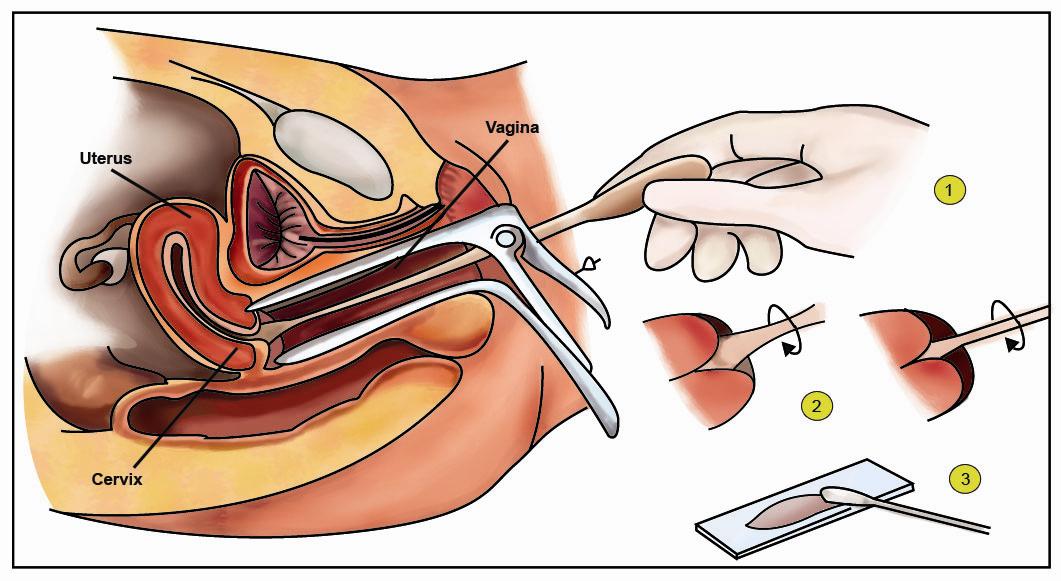
I have just had my baby and during my postnatal check, my doctor mentioned that I should have a cervical smear. What is a cervical smear?
A cervical smear (also called a pap smear) is a test that takes cells from the surface of the cervix. It is meant to detect precancerous changes that may be present on the cervix.
What is the cervix?
The cervix is an organ located just below the uterus. It has an opening that allows the flow of blood from the uterus during a woman’s monthly menstrual flow and helps to hold a pregnancy in place until it is ready for delivery at term.
How is a cervical smear taken?
Your doctor or nurse will use a device called a speculum that is inserted gently into the vagina to help visualise the cervix. A wooden spatula or plastic brush (cytobrush) is then applied to the cervix in a circular motion to obtain a sample of cells.
I am worried that a cervical smear is done so soon after my delivery. Is it going to be painful?
Your doctor will usually advise that a cervical smear is done six to eight weeks after your delivery. During this time, your vagina would have healed well enough to allow the passage of the speculum for the test to be done without too much discomfort.
I am still having some slight vaginal bleeding at the time of my postnatal check. Can my cervical smear still be done?
The presence of blood will lead to difficulties in reading the cervical smear result. Your doctor will advise you to wait until your menstrual cycle has resumed and then perform a cervical smear after the time of your period. It is important to consult your doctor if your bleeding has not settled postnatally.
Is having a cervical smear effective at preventing cervical cancer?
Yes. As a result of detecting precancerous abnormalities and treating them early, the use of regular cervical smears has reduced the incidences of cervical cancer in countries such as the United Kingdom and Australia. The incidence of cervical cancer is high in countries that do not have a good cervical screening programme.
How are cervical smear abnormalities treated?
Your doctor may recommend a repeat cervical smear six months later if the initial result was regarded as a mild abnormality. If the result is a severe abnormality, then a colposcopic examination (examination of the cervix with a special camera) will be advised. This will help the doctor identify areas of the cervix that have an abnormality. The doctor may then take a small sample of the cervix (biopsy) or advise that an excisional biopsy be taken if necessary.
How do precancerous abnormalities of the cervix develop?
These abnormalities develop as a consequence of persistent infection of the cervix by HPV (Human Papilloma Virus). Once these precancerous abnormalities develop and persist, they may slowly turn into cervical cancer.
How can I present myself from getting HPV infection?
HPV infection is common and estimates suggest the lifetime risk of having it could be as high as 50% in people who are sexually active. Thus, anyone who is sexually active could be at risk of getting a HPV infection. One of the best ways of preventing HPV infection is with the use of a HPV vaccine. There are two vaccines on the market that can prevent HPV infection.
How is the HPV injection given?
The injection is given as a course of three intramuscular injections. Usually it is given at the upper arm. The exact timing of the injection will depend on the type of vaccine used. The vaccination schedule for both vaccines will be completed over six months.
Is the injection safe?
Yes it is. There is a good amount of data to show that there are no serious side effects from having the vaccination. Any reports about the vaccine being harmful have not been proven to be true after careful investigation.
What happens if I become pregnant when while I have the injection?
There is no data to show problems if a patient is found to be pregnant after having a HPV vaccine. Subsequent vaccinations, however, will be deferred until after the baby is born.
Can I have the HPV vaccine while I am breastfeeding?
Yes. The HPV vaccine can be given safely to mothers who are breastfeeding.
Do I need a HPV test before I have the vaccine?
No there is no need for a HPV test to be done before vaccination.
Where can I get the HPV vaccine and who should I speak to about it?
The vaccine is now readily available in most family medicine, paediatric and gynaeocology clinics. The doctors in these clinics would be able to provide detailed information about HPV vaccination.
Article written by:
Dr Paul Ng
MBChB (Leicester), MRCOG (London, UK)
Consultant obstetrician & gynaecologist and gynaecological oncologist
Pantai Hospital, Kuala Lumpur (Bangsar)
Filed under Post Partum Care | No Comments









